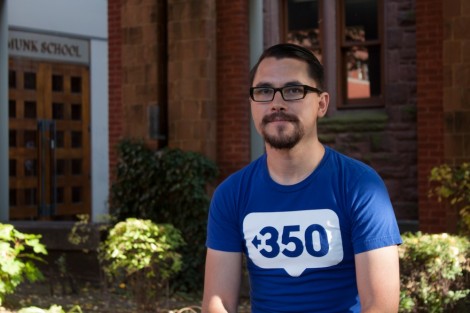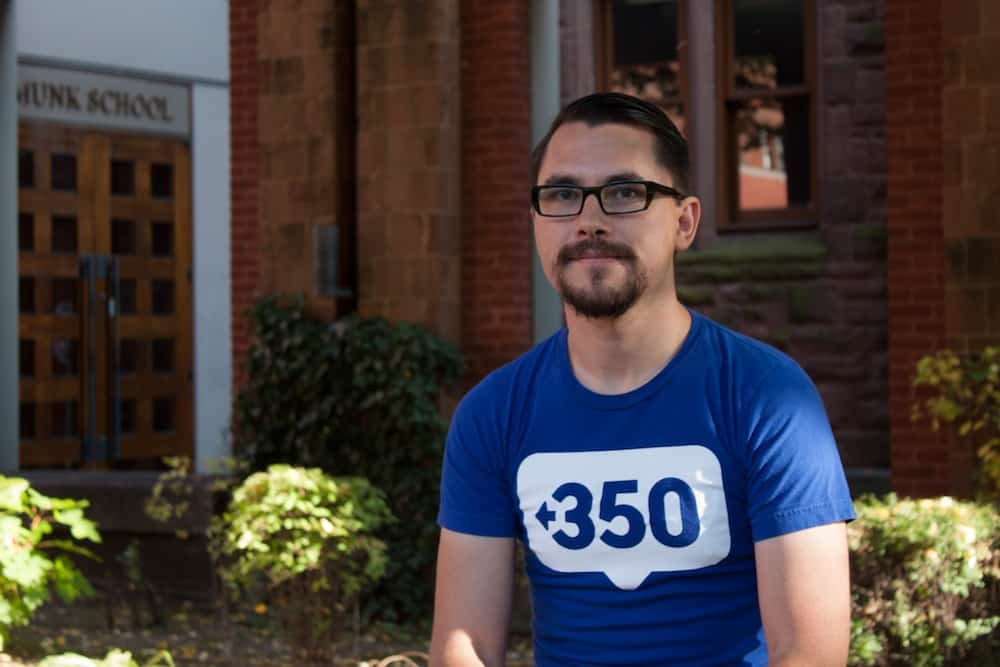Toronto350.org, an environmental activist organization, continues to pressure the University of Toronto and its administration to divest its shares in fossil fuel corporations. The local chapter, which was founded in June 2012, hopes to go before an ad hoc committee at the request of U of T president David Naylor.
Milan Ilnyckyj, an organizer with Toronto350.org, outlined the group’s four main pillars of divestment: an official statement of intention to divest, the cessation of new investments in fossil fuel corporations, the gradual divestment from any existing ventures in fossil fuel, and a complete divestment from Royal Dutch Shell within a year.

Toronto350 organizer Milan Ilnyckj. CAROLYN LEVETT/THE VARSITY
“Universities are these entities … that expect to exist forever and are making investment decisions on this very long term basis,” Ilnyckyj said. “Investing according to a different philosophy would send a message to others that fossil fuels are a problematic place to invest your funds.”
With $9.84 million invested, Royal Dutch Shell is the university’s largest holding both domestically and internationally. When asked about the potential financial risks to U of T of divestment from the company, Ilnyckyj responded with a cautionary warning: “as climate change becomes a more prominent issue, governments will be more willing to regulate fossil fuel corporations, ultimately leading to a real possibility of [hindered] university endowments.”
Ilnyckyj also cites a potential “uptick in donations from alumni, as people begin appreciating the progressive stance [U of T] has taken.” This contrasts sharply with the reality of the movement’s global accomplishments. So far, only six American colleges and universities have pledged to pursue fossil fuel divestment. Following a failed attempt at McGill, no Canadian divestment movement has been succesful.
Dr. Anthony Gray, director of strategic initiatives and research for the president, issued a statement regarding Toronto350’s goals and the plan of divestment. In it, the Office of the President stated that it has “been involved in providing procedural guidance to Toronto350.”
The statement continues, saying that “if and when [the president] does receive a formal petition, then, following the terms of the Policy and Guidelines, the president may establish an ad hoc committee to consider it. The committee may seek additional information and advice from the University of Toronto Asset Management Corporation (UTAM) and others before arriving at any list of recommendations in response to the petition.” UTAM did not respond to The Varsity’s request for a statement.
Meanwhile, investment apprentices within the U of T community have come out against Toronto350’s platform. Justin Lee, president of U of T’s Rational Capital Investment Fund, deconstructed the purpose of U of T’s asset management policy: “If we have an investment fund and its primary goal is to provide financial support for students to attend university and learn, then it’s clear that there should be no restrictions. This is clearly an attempt to politicize what should be non-political issue.”
Representing the only student-run investment portfolio at U of T, Lee spoke more broadly about the moral relativism of the investment strategy. “Where do you draw the red line? Whose morals trump everybody else’s? This strikes me as an attempt to subvert the process and subordinate the original goal of the fund.”
Regardless, Toronto350.org will continue its two-pronged approach towards divestment. The plan includes both a petition, which anyone can sign, as well as an endorsement attestation, which is a university-mandated procedure that requires adequate support from faculty, students, and alumni in order for Governing Council to consider a petition. The petition is currently at 700 signatures, while the attestation is at upwards of 100 endorsements. It remains unclear whether Toronto350 will gain the momentum needed to put it on the map as the first Canadian divestment platform to achieve traction with university administrators.


